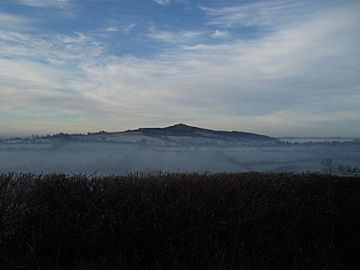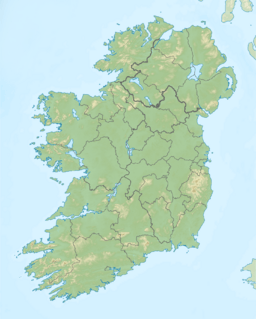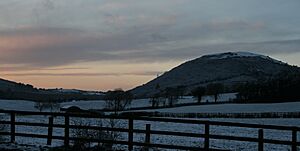Knockeyon facts for kids
Quick facts for kids Knockeyon |
|
|---|---|
| (Cnoc Eoghain) | |

Knockeyon on a foggy morning
|
|
| Highest point | |
| Elevation | 214 m (702 ft) |
| Prominence | 128 m (420 ft) |
| Geography | |
| Location | County Westmeath, Ireland |
Knockeyon (which means Cnoc Eóin in Irish) is a hill located in County Westmeath, Ireland. It's found in the area known as Streamstown. When you look at Knockeyon from certain directions, like Ranaghan or Gillardstown, it really stands out. It looks huge compared to the lakes and countryside around it in northern County Westmeath. On a clear day, you can see for miles from the top! You might even spot the chimney of a cement factory far away or the distant Mourne Mountains.
Contents
Exploring Knockeyon: Where is it?
This interesting hill sits right on the southeastern edge of Lough Derravaragh. From its slopes, you can see a large part of the northern Leinster countryside. It's a great spot to take in wide, open views.
Ancient Chapel: A Historic Ruin
Halfway up Knockeyon, you can find the remains of a very old chapel. People believe it was built by a saint named Cauragh. It was dedicated to Saint Eyon, which is another name for Saint John the Apostle. His feast day is celebrated on August 3rd.
Pilgrimages to the Chapel
For many years, people would come to this chapel for a special event called a pattern. This usually happened around the first Sunday of August. In 1682, a man named Sir Henry Piers described these visits. He said that the chapel was carved right into the natural rock. One side of it was simply the stone of the hill itself!
Inside the chapel, there was a clear stream of water flowing from the rock. This stream would run through the chapel and then down to the lake below. The path to the chapel became very narrow as you got closer. It was even cut into the rock in some places. Trees growing from the water below helped make the path safe.
People would walk barefoot for part of their journey to the chapel. For the last section, they would even crawl on their bare knees over stones and grass! After their prayers, they would return happy and put their shoes back on. Then, they would gather on a grassy spot nearby to dance and celebrate. There were even people selling drinks, like at a fair, and bagpipers playing music.
What the Chapel Looks Like Now
In the late 1800s, another person, Reverend Cogan, wrote about the chapel. He mentioned the holy well there, which many people visited. Priests would also come to hear confessions and help people prepare for a religious ceremony.
Today, only the very bottom parts of the chapel walls remain. It's located within a thick woodland of hazel and oak trees. Old maps from 1911 show it as a small rectangular building where four woodland paths meet.
Wildlife and Nature on Knockeyon
Knockeyon and the hills around it are covered in beautiful deciduous woodlands. This means the trees lose their leaves in autumn. Most of these trees are native to Ireland. You'll find lots of hazel, rowan, ash, and oak trees. Sometimes, you might see trees that were brought from other places, like horse chestnut or beech trees.
Birds of Knockeyon
The nearby Knockbody Wood is home to wild pheasants. It's a popular spot for hunters. The area is also very important for birds that live near water. For example, the number of Common pochard birds (a type of duck) here is one of the largest in Ireland. Sometimes, there are so many that it's considered important for birds all over the world!
Below is a table showing some of the wildfowl (water birds) counted in the area during the winter of 1996.
| Wild fowl | Winter 96 (individuals) |
|---|---|
| Little grebe | 42 |
| Great crested grebe | 34 |
| Cormorant | 34 |
| Mute swan | 159 |
| Whooper swan | 102 |
| Greenland white-fronted goose | 409 |
| Wigeon | 207 |
| Teal | 52 |
| Mallard | 195 |
| Pintail | 6 |
| Shoveller | 12 |
| Pochard | 3,129 |
| Tufted duck | 1,073 |
| Goldeneye | 46 |
| Coot | 1,358 |
| Golden plover | 158 |
| Lapwing | 1,079 |
 | Aaron Henry |
 | T. R. M. Howard |
 | Jesse Jackson |



